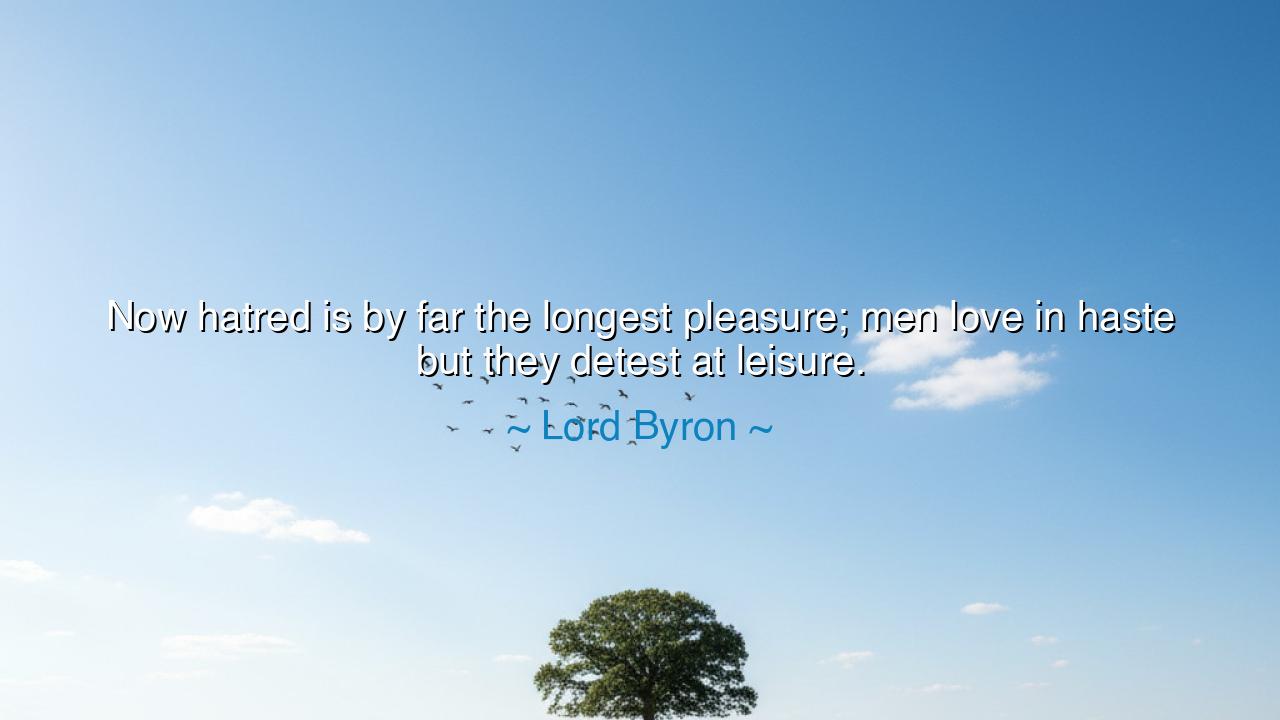
Now hatred is by far the longest pleasure; men love in haste but
Now hatred is by far the longest pleasure; men love in haste but they detest at leisure.






“Now hatred is by far the longest pleasure; men love in haste but they detest at leisure.” Thus spoke Lord Byron, the poet of storm and flame, whose heart burned with the passions and contradictions of the human soul. In this dark yet truthful reflection, Byron exposes the twisted endurance of hatred and the fleeting nature of love. He speaks as one who has walked the heights of romance and the depths of betrayal, who has seen how swiftly affection can ignite — and how long resentment can smolder. His words are not a celebration of hatred, but a lament for the frailty of the human heart — that what is most divine in us fades too soon, while what is most destructive clings too long.
Byron lived in the early nineteenth century, a man of immense genius and scandal. His poetry was filled with beauty, rebellion, and sorrow, and his life mirrored the turbulence of his art. Having loved deeply and been betrayed, having inspired devotion and provoked enmity in equal measure, he wrote from the crucible of experience. When he said that men “love in haste but detest at leisure,” he was speaking not only of others, but of himself. For Byron knew that love often comes upon us like a storm — fierce, dazzling, consuming — but hatred, once born, does not roar; it festers. It sits quietly in the heart and grows roots, feeding on memory and pride until it hardens into cold pleasure.
In his phrase, “the longest pleasure,” lies a terrible irony. Pleasure is meant to be sweet, yet hatred offers a false sweetness — the intoxication of vengeance, the thrill of superiority, the dark satisfaction of resentment. Humanity, Byron suggests, is tragically drawn to this pleasure because it demands nothing noble — only surrender. Love, by contrast, requires humility, forgiveness, and courage; hatred requires only indulgence. And so men “love in haste” because love is daring, and they fear it; but they “detest at leisure” because hatred feels safe, familiar, even comforting in its bitterness.
Consider the tale of Achilles and Agamemnon, two heroes of the ancient world. They fought side by side against Troy, but when pride divided them, hatred took root. Achilles withdrew from battle, consumed by wrath against his commander. Though love for his friend Patroclus would later drive him to greatness, the hatred he nurtured against Agamemnon endured — even after victory. The Iliad, the first great epic of the West, begins not with love but with anger — the “wrath of Achilles.” Byron’s words echo across the centuries: love is swift as lightning, but hatred is slow and enduring, feeding upon itself until it becomes one’s identity.
Yet in this recognition lies a warning, not despair. Byron’s wisdom calls us to see hatred for what it is: a corruption of the heart’s power to love. For the same energy that sustains hatred could, if turned, sustain compassion. Hatred is the shadow of passion; it shows that the heart still burns. The challenge, then, is to transform that fire — to rise above the easy pleasure of resentment and choose the harder path of grace. The ancient philosophers taught that true strength lies not in vengeance but in mastery over one’s emotions. To conquer hatred is not to forget injury, but to free oneself from its chain.
History, too, bears witness to this truth. Consider Nelson Mandela, who after twenty-seven years in prison emerged without bitterness toward his captors. He had every reason to hate, and yet he chose forgiveness. “Resentment,” he said, “is like drinking poison and hoping it will kill your enemies.” Mandela understood what Byron warned: that hatred is not pleasure but poison disguised as power. By releasing it, he became greater than those who wronged him. His life transformed Byron’s lament into a lesson — that the heart’s highest triumph is not in love’s fleeting blaze, but in forgiveness’s enduring light.
So, O children of passion and pride, hear this teaching well: beware of hatred’s sweetness. It tempts you to linger in its warmth, but it leaves your soul cold. Love swiftly, but nurture that love with patience, so it may endure. When wronged, resist the leisure of detesting; for every moment spent in hatred is a moment stolen from peace. Remember that even the fiercest flame of anger dies when it runs out of fuel — and the fuel is your attention. Turn instead toward compassion, and you will find that love, though it begins in haste, can be made to endure beyond time itself.
For in the end, as Lord Byron knew, both love and hatred are born from the same fire — but only love has the power to create. Hatred consumes, love transforms. And though hatred may seem the “longest pleasure,” it is love, once purified by suffering, that becomes eternal. Therefore, live not in the leisure of detesting, but in the labor of loving — for only in that labor does the soul find peace.






AAdministratorAdministrator
Welcome, honored guests. Please leave a comment, we will respond soon